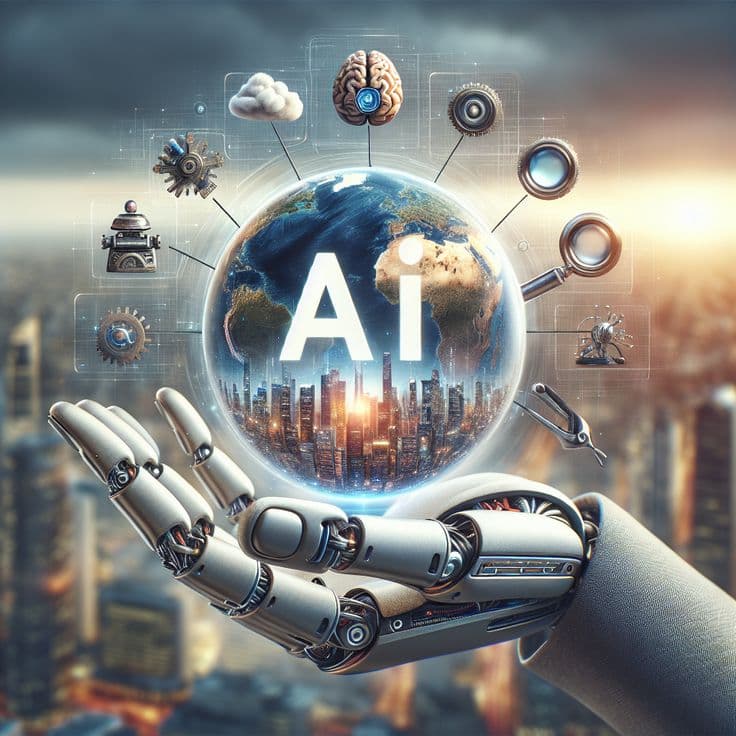Managing resources and services in growing areas presents challenges as the population expands within cities. Artificial Intelligence is considered a solution to create designed and sustainable cities that offer an ideal living environment. Such integration allows cities to perform more efficiently, lessen environmental harm, and enhance the well-being of their citizens.
What is a Smart City and AI's Role?
Using artificial intelligence (AI), a city's information and communication technologies (ICT) can be utilized in enhancing urban systems and services. The goal is to meet the needs of both society and the environment, for today and tomorrow by using AI to improve resource management and enhance safety and urban mobility with data analysis, for sustainable and eco-friendly city growth.
For example, artificial intelligence traffic management optimized systems redistribute traffic to minimize congestion and reduce emissions in real-time. With the help of pattern identification, AI systems improve the timing of changes allowing a high increase in performance, particularly in urban mobility. In addition, artificial intelligence in smart cities assists in energy, water, waste, and citizen service management creating an integrated urban landscape that offers versatility.
Key Initiatives in Smart Cities
AI-led sustainability projects have already been initiated in a few cities like Abu Dhabi Dubai and others. Steps have been taken in Abu Dhabi and Dubai in the Middle East region for initiation of the projects which deal with environmental and technology issues.
Abu Dhabi's Masdar City exemplifies sustainable urban planning, using solar energy and AI-driven systems to reduce energy and water consumption. The city's AI-enhanced infrastructure supports efficient cooling, waste reduction, and eco-friendly design.
The Zayed Smart City Project also uses IoT devices and AI to monitor urban systems, including traffic, utilities, and public safety. This project aligns with Abu Dhabi's Economic Vision 2030, which emphasizes a shift toward a knowledge-based economy and technological innovation.
The city of Dubai has integrated intelligence across areas of urban development. In the Dubai Plan 2021 initiative, AI is utilized for analyzing data and making decisions, in transportation and infrastructure projects. At City AI plays a role, in managing energy usage and promoting agriculture to improve resource utilization and minimize waste production. Furthermore, achieving 25% of self-driving transportation of cars in 2030 in Dubai will also help cut congestion and enhance the safety of the roads.
Generative AI and Citizen Engagement
Generative AI, which has the capability of content creation, expands smart cities potential in terms of creating new means for active citizens engagement and for easy access to the services. For example, Buenos Aires' AI chatbot "Boti" assists citizens with services ranging from bike-sharing to social care. Singapore is using generative AI in digital twins—virtual models of city infrastructure—to improve urban planning and resource management, aligning with the country's National AI Strategy.
AI's Contribution to Sustainability
The use of AI in particular enhances the management of data. This means that resources can be properly managed while also boosting strategic planning. A good example of this is smart streetlights that have sensors and AI, which enables the modification of illumination, control of traffic levels, as well as energy conservation and urban data collection at the same time. AI also transfigures the waste management industry as it optimizes collection routes and scopes of recycling in a way that reduces the amount of waste taken to landfills dramatically.
AI also facilitates the management of renewable energy resources. With AI smart grids, power supply and demand can be balanced to avoid interruptions in power supply while enhancing the utilization of wind and solar energy. These AI-driven solutions also play a critical role in enabling cities to achieve their sustainable development objectives and cut down on the negative impacts on the environment.
The Future of AI in Smart Cities
AI in this case is also about improving the cities one step at a time, be it the environment, the economy or society at large. A good example is the automated transport in the city of Dubai while in Masdar City the focus is on cutting waste. The city’s-built environment is changing for the better through AI and it is more resilient, integrated and also culturally relevant. Cities are gradually incorporating AI within their systems and this invariably changes the urban landscape for the better.
Join us at AIM Congress 2025
AIM Congress is an initiative of the AIM Global Foundation. It aims to empower the global economy by utilizing the right opportunities and strategic promotion. As an investment platform, AIM Congress is dedicated to creating valuable opportunities for investors across borders.
The focus of AIM Congress 2025 is to create a globalized investment landscape through a balanced world structure, emphasizing 8 pivotal portfolios, out of which one is Future Cities. Join us at AIM Congress 2025 to explore more about how AI in Smart Cities is creating efficient and sustainable urban environments.
